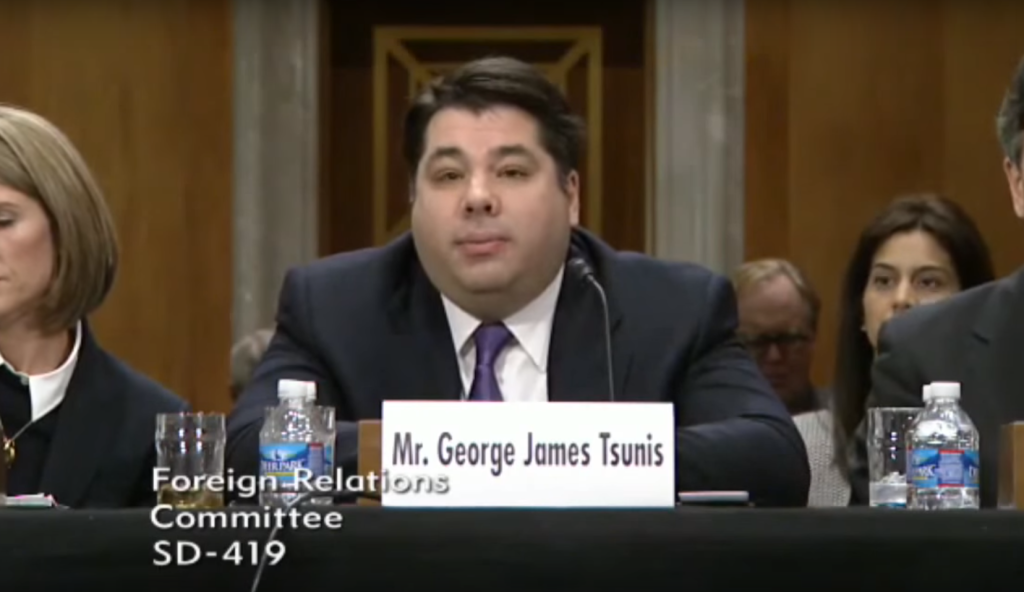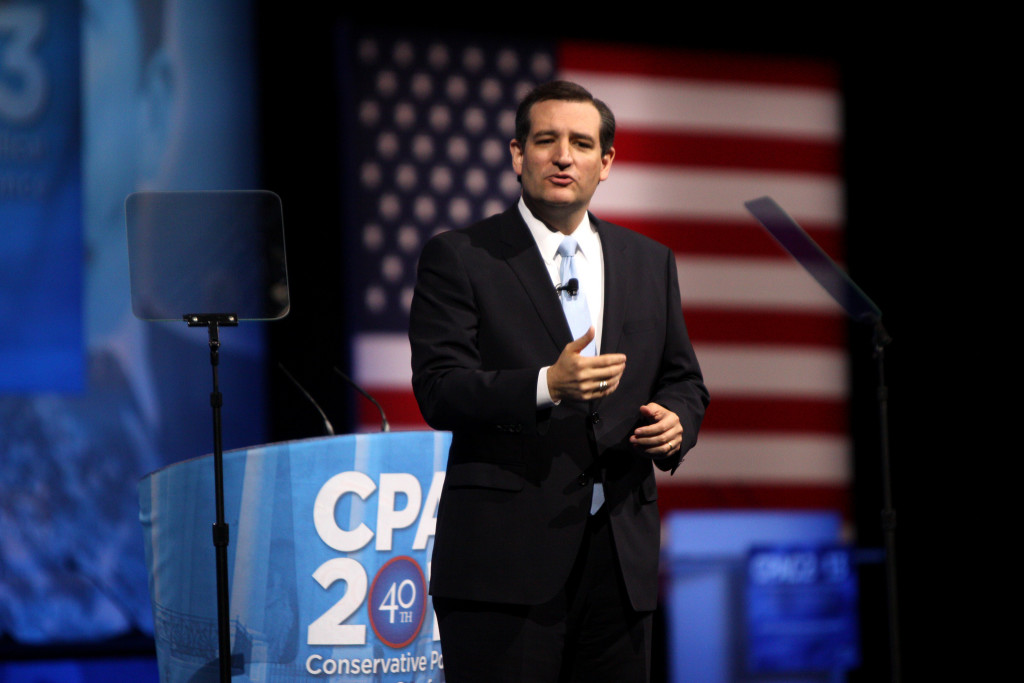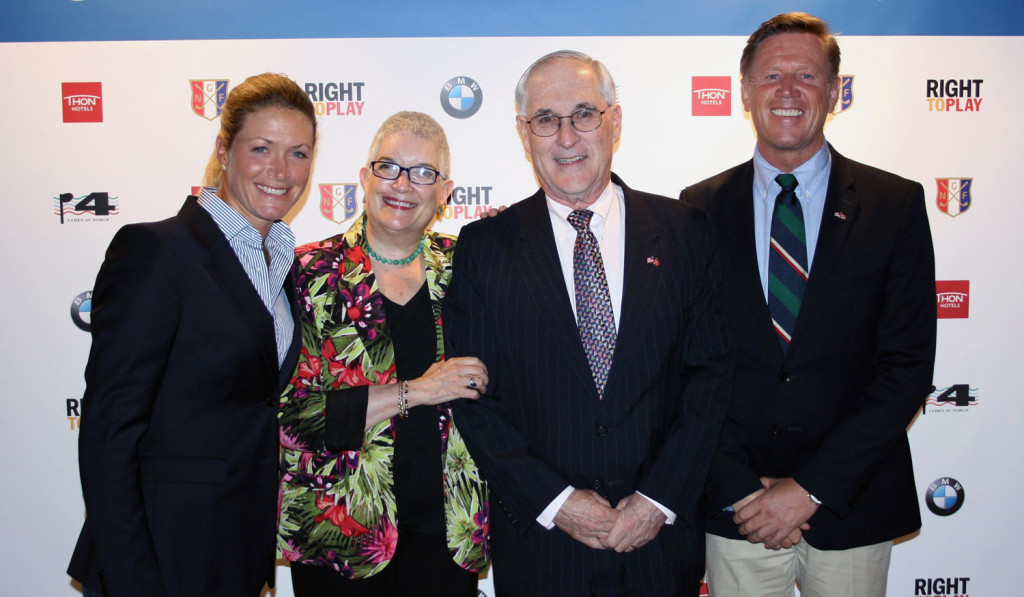Norway has never gone this long without an American ambassador at the U.S. Embassy in Oslo. Norwegians may now face the scary scenario of Donald Trump sending a representative, three years too late.
A Norwegian-language version of this commentary is also available
In September 2013 the American Ambassador to Norway, Barry White, completed his posting and left the country. 840 days later the United States has yet to send a replacement. That’s more than 120 weeks, or over two years and three months. Now, Norway risks having to wait until spring 2017. In other words, our closest ally will then have neglected to send a presidential representative for over three years.
The story behind this failure is complicated, but illustrates a political situation in the U.S. that is crippling the president’s ability to effectively carry out foreign policy. The story includes a failed nomination, “The Nuclear Option”, the P5+1 Iran deal, and not at least, the race for 2016.
The Tsunis Fiasco
In September 2013, President Obama nominated the Greek-American businessman George Tsunis to succeed Barry White as ambassador to Norway. During his tenure, White had to deal with a row over tax evasion among local employees, as well as the Snowden/ NSA-scandal. By all accounts though, he weathered these situations and left Norway with a good reputation. At the time, I worked in the Public Affairs Section and dealt with the ambassador on an almost daily basis. As such, my colleagues and I were curious about the new nominee. To us, he did not seem like a particularly controversial choice, and at the time of the nomination, the story got little traction. However, Tsunis himself made sure that would soon change.
In the “Hearing heard around the world” Tsunis managed to show shocking lack of knowledge about the country he was about to move to

During the 2008 election, Tsunis backed John McCain for president, and donated $50,000 to the Arizona Senator’s campaign. In the next election however, Tsunis had switched sides and became an effective bundler for Obama, bringing in upwards to $840,000 for the president’s reelection campaign. Ironically, Tsunis soon met McCain again, since the Senator sits on the Foreign Relations Commitee, which initially approves ambassadorial appointments. The reunion was not nearly as pleasant as Tsunis probably had hoped.
In the “Hearing heard around the world” Tsunis managed to show shocking lack of knowledge about the country he was about to move to. Not only did he offend one of the parties in government, but also referred to the country as a republic run by a president (it’s a Constitutional Monarchy, where the king is the Head of State and the government is run by a Prime Minister), and admitted that he himself had never visited Norway. The media blitz that followed soon made it clear that Tsunis would never become ambassador to Norway, and in late 2014 he withdrew his name from consideration.
Over a year later, the U.S. has still not managed to send an ambassador to Norway. The new candidate, a human rights activist and lawyer from Minnesota, is caught in the ever-escalating feud between the president, and Congressional Republicans and Democrats. With the advent of primaries and caucuses soon upon us, the prospect of any sort of solution this year looks bleak.
«The Nuclear Option»
The U.S. Constitution is shaped with an aim to prevent the executive branch from becoming too powerful. Checks and balances ensure that Congress and the judicial branch act as counter forces to the president. One such “check” is the Senate’s prerogative to approve judicial appointments and ambassadorial appointments. Historically, the Senate has paid more attention to judicial nominations, particularly to the Supreme Court, than to ambassadors. Since Supreme Court justices are lifetime appointments, this is only natural. Moreover, tradition mandates that Congress gives the president leeway in conducting foreign policy. As such, ambassadorial appointments have been less of a point of contention.’
Senate Democrats, frustrated that a historically low number of nominations were going through, invoked “The Nuclear Option”
In 2013, this all changed overnight. Senate Democrats, frustrated that a historically low number of nominations were going through, invoked “The Nuclear Option.” While the term sounds quite alarming, the change is merely a change in procedural rules. That being said, it did in fact eliminate the Filibuster rule for certain appointments and thus was a dramatic turn. From now on, all appointments with the exception of Supreme Court Justice nominees, would go through with a simple majority (51 votes, rather than the previously required Supermajority). In response to the change, Senate Republicans invoked a number of procedural moves to slow down confirmations.
This situation is exactly what is slowing down the Norway nomination
Among others, the Republicans have turned to a tradition called “Unanimous Consent.” Basically, this approach allows for Senate business to get done quicker by unanimous votes without debate. Instead, the Majority Leader will probe Senators for any dissent on issues brought before the body, but are often able to confirm ambassadorial nominees in groups. However, by the same token, one single Senator can slow down nominations by voicing opposition to one or more nominees, and thereby not allowing unanimous consent. The reason for the dissent does not have to be related to the actual appointment, and this situation is exactly what is slowing down the Norway nomination, as well as others.
Sam Heins, an uncontroversial choice

In May, President Obama nominated Sam Heins to become the new ambassador to Norway. He is now one of at least 32 nominees currently being held up in the Senate. As an experienced attorney and human-rights advocate, hailing from the “Norwegian state” of Minnesota, Heins seems like an uncontroversial choice. As has been the case for most of his predecessors in Norway in recent time, he is a political nominee.
Around one-third of U.S. ambassadors serving abroad are such non-career appointees. While one could argue about the value of sending foreign service professionals versus political appointments, the latter has seemingly done nothing to damage bilateral relations between Norway and the U.S. in the past.
Around one-third of U.S. ambassadors serving abroad are such non-career appointees
This week I talked to former ambassador to Norway, Barry White, who spoke highly of Heins: “He is an excellent choice who would do a very good job of strengthening the already excellent bilaterial ties between the U.S. and Norway.” Ben Whitney, his Republican predecessor shares this view.
P5+1: The Iran Nuclear Deal
Sam Heins sped throug the initial hearing of the Senate Foreign Relations Committee this past summer. Norway was finally poised to get a new ambassador. Then, the so-called P5 countries, which included the United States, announced “a historic deal” with Islamic Republic of Iran regarding its nuclear capabilities. All hell broke lose in Congress. Most Republicans oppose the deal, which they believe does little to halt Iran’s nuclear ambitions. Ted Cruz (R-Texas), one of the leading contenders for the GOP nomination for president, has been one of most vocal opponents of the Iran-deal. Cruz is a contentious figure in the Senate, and probably not likely to become much more cooperative any time soon.
One would hope that Cruz considers the ironic fact that if he launches a successful bid for the White House, he could find himself in Obama’s shoes in a year

Shortly after the P5+1 deal was announced, Cruz warned that he would put a hold on all of Obama’s politicially appointed ambassadorial nominations to protest the deal. The hold is still in place. One would hope that Cruz considers the ironic fact that if he launches a successful bid for the White House, he could find himself in Obama’s shoes in a year. However, sources who are familiar with the work of the Senate say that the Senator from Texas does not seem likely to change this position any time soon. It is possible that Senate GOP leadership could schedule a an actual floor vote, with debate, to get around the Cruz hold. Rumor has it that Minnesota Senators are putting pressure on the leadership to schedule such a vote, but nothing is certain as of now.
An awkward hiring process
Cruz has not been the only hindrance for Sam Heins. A number of scandals have rocked the Secret Service in recent years. In 2012, more than twenty agents were punished after allegedly spending time with prostitutes during a presidential visit to Mexico. Last year, the agency faced criticism after a man armed with a knife managed to penetrate White House security barriers. Last year, two agents were caught driving through a security barrier by the White House, under the influence.
In the wake of these incidents, Congressman Jason Chaffetz (R-Utah) called a Congressional hearing to investigate the Secret Service. Shortly after, several Secret Service personell leaked embarassing information about Chaffetz, who apparently had failed to obtain employement with the agency ten years prior. Republicans were furious, and Senator Tom Cotton (R-Ark) responded by placing a hold on ambassadorial appointments to Norway, Sweden and the Bahamas. The hold would be in place, Cotton stated, until President took steps to punish those behind the leak. While Cotton has since removed this hold, the ordeal surely slowed down confirmation of Heins.
Why does it matter?
The American Embassy in Oslo is staffed by very capable diplomats and very experienced local employees. Together, they ensure that the bilateral relationship between Norway and the U.S. remains strong. Moreover, the recently arrived Chargé seems quite motivated to fill the void currently left by the absence of an ambassador. Lastly, Secretary Kerry and the Norwegian Foreign Minister Børge Brende seemingly have an exceptional relationship, which makes the absence of an ambassador less felt.
There is no equivalent representative to the president’s appointed delegate to a country
That being said: There is no equivalent representative to the president’s appointed delegate to a country. Sources who know the bilateral cooperation well have pointed out to me that the situation would definitely be worse in a country where hierarchy and formal communication means more than in Norway. However, there is still a concern that Norwegians may eventually consider the prolonged lack on an ambassador as an affront. Such a concern likely does not apply to the Norwegian Ministry of Foreign Affairs, which is well aware of the fact that domestic politics alone have caused this situation.
The prestige that comes with having an ambassador present is hard to replace
Also, without a U.S. ambassador in Norway, the efforts to promote cultural, educational and business ties are likely to decrease when an ambassador is not present at a post. More than anything, the ambassador often plays a symbolic role by attending several hundred public and non-public events every year. The prestige that comes with having an ambassador present is hard to replace. While other embassy personell may be just as good of a replacement, the ambassador often takes a personal interest in this work, and therefore drives such efforts forward.

On a more general level, the current situation completely exposes to the world what Kjell Tore Ringdal, an expert in political rherotic, has deemed as a “very sore, and inflamed conflict between the presidency and Congress.” This conflict is ingrained in the political system, but has reached new levels in recent years. For many Norwegians it probably seems both odd and incomprehensible that one of the world’s superpowers cannot manage such a simple task as to deploy an ambassador to a close ally like Norway. It becomes more incomprehensible when one considers the fact that the hold-up is not related to neither the candidate, nor the bilateral relationship.
The United States loses the most by not managing to send a new ambassador to countries like Norway
In other words, the United States loses the most by not managing to send a new ambassador to countries like Norway. Former Vice President Walter Mondale recently wrote in the New York Times that it is in America’s national security interest to fill such positions, and that especially “[i]n a time of dangerous international crises, we need to work with friends and allies, using all the tools of diplomacy.” Considering the current situation, both Mondale and Heins must seemingly have to wait for a long time for any improvement. Unless Senator Cruz suddenly finds a moment of clarity, the race to 2016 is likely to freeze any movement on the appointments. That being the case, a new U.S. ambassador to Norway would probably not arrive until spring 2017.
If Donald Trump or Ted Cruz then occupy the White House, Norway may find itself welcoming a completely different character than Sam Heins. I believe most Norwegians agree with me that it is probably best for all of us if we avoid that scenario. It is time: Congress, send Norway an ambassador!
Agenda Magasin is an online magazine for political analysis, commentary, debate and interviews. Content is published primarily in Norwegian, and the editorial staff is based in Oslo. For questions related to this article, please contact Thor Steinhovden.




Kommentarer